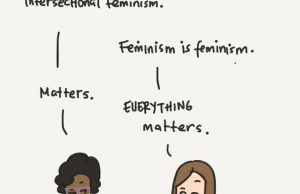COLLEGE FEMINISMS:A Statement of Clarification Acknowledging The Presence of Rape Culture
By Dani Cofini and Kelly Casey
According to feminist theory, rape culture is defined as the normalization, victim-blaming, and tolerance that often pardons rape and sexual assault. In order to rid our society of this oppressive, misogynistic mentality, it is important to recognize how prevalent rape culture is in a given environment. Recently, UConn Student Carolyn Luby wrote, “An Open Letter to President Susan Herbst” to accomplish this common goal.
She argued that, instead of using university resources to redesign the UConn logo, President Herbst and the Board of Trustees should consider a more pressing, influential issue – violence against women on the UConn campus. Luby structured her argument in a respectful, neutral manner, and she hoped that her letter would be well received by President Herbst and her colleagues. However, when Luby’s piece was released to the public, the media completely misconstrued her line of reasoning. Popular websites like Facebook and Barstool, poked fun at Luby’s letter and said that her underlying argument was that the new UConn logo “promotes rape.” In reality, Luby only referenced the logo to illustrate a larger issue.
The letter was NOT about the new Husky mascot, and it did NOT imply that UConn’s recently transformed mascot resembles a “raping canine” that students should fear. Her letter was not a plea to President Herbst, asking her to create a less aggressive logo to decrease violence on campus. Conversely, Luby simply stated that UConn’s reinvented mascot exemplifies the kind of aggression that is continuously bypassed and validated by the UConn community. She merely asked President Herbst to publicly recognize reality – that sexual assault, rape, aggression and violent acts DO occur at UConn – and actively create an open conversation between the university and its students that diminishes the manifestation of rape culture.
Without a doubt, Luby’s life has been directly affected by this controversy. She has received an incredible amount of attention for her letter, and she has become the topic of conversation and debate. However, to fully grasp this controversy, we must acknowledge that these issues do not only impact the lives of isolated individuals. The problem here extends much further than those named in the media coverage and articles. This issue is not just about Luby, President Herbst, or the male athletes that were mentioned in Luby’s letter. Rape culture, as well as the ways authority approaches instances of sexual violence, affect the UConn community as a whole. By placing the focus of this issue on the actions or lack of actions by specific individuals, a binary relationship is created, where one person is pitted against the other. And as a result, we lose sight of the true problem.
The problem, as further revealed in the various crude remarks and threats posted on certain websites against Luby, is the way members of the UConn community downplay rape and violence. Additionally, when Luby brought these threats to the attention of the UConn police, she was instructed to “put up her hair and wear a hat while walking around the UConn campus.” These responses further reflect the view that rape and sexual violence should be dealt with on an individual basis, rather than at a structural level. Not only do these responses turn this problem into something that requires action solely of the victim, but they also fail to place responsibility on the perpetrators.
As a community, we need to educate ourselves about rape culture, recognize its presence on our campus, and find an appropriate way to handle violence. These are the points that Luby brings to the surface and emphasizes in her letter to President Herbst – not how the new Husky logo promotes rape. This misunderstanding of Luby’s letter reflects the need for our UConn community to acknowledge the real issue at hand, which is the presence of rape culture on campus.
In the words of Audre Lorde,
For we have been socialized to respect fear more than our own needs for language and definition, and while we wait in silence for that final luxury of fearlessness, the weight of that silence will choke us. Sister Outsider: Essays and Speeches by Audre Lorde (1984).
By openly addressing the prevalence of rape culture and violence on UConn’s campus, we will highlight problems that were previously bypassed and ignored. As suggested by Luby, it is our responsibility as a community to continue this conversation and put an end to silence. Because, as stated by Lorde, “…there are so many silences to be broken” (Lorde, 2007 [1984], p. 44).
_______________________________________________
 Dani Cofini is a senior at the UConn majoring in Communications with a minor in Women, Gender and Sexuality Studies.
Dani Cofini is a senior at the UConn majoring in Communications with a minor in Women, Gender and Sexuality Studies.
Kelly Casey is a senior at UConn majoring in Communication disorders with a minor in Psychology.




0 comments